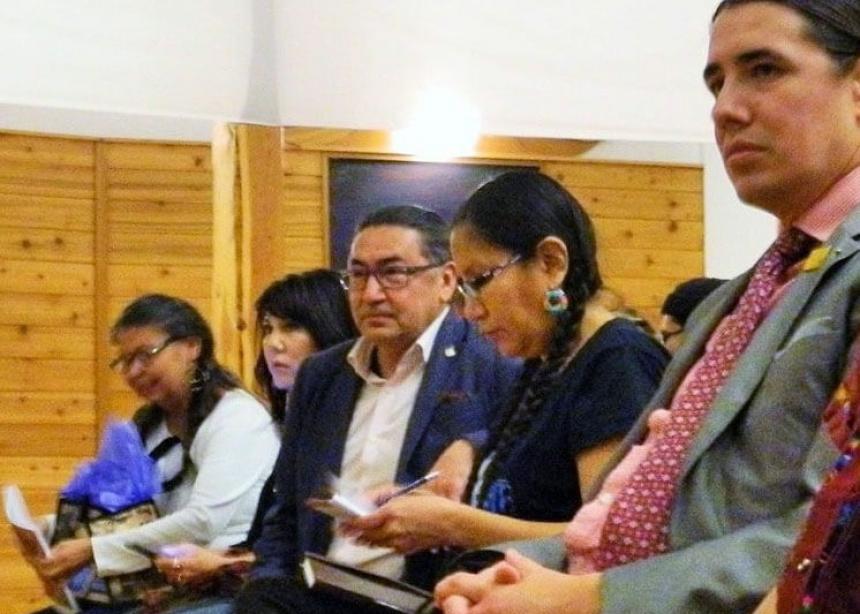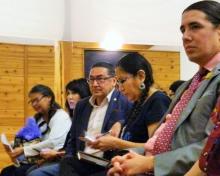Mennonite organizations played a large role in putting on a public panel discussion on indigenous land rights in Canada and how they impact social groups at the community level, held late last year at Winnipeg’s Circle of Life Thunderbird House. Entitled “Consult or consent,” the event was sponsored by Mennonite Church Canada, the Canadian Mennonite University Student Council, and Kairos (of which Mennonite Central Committee is a member), along with three other organizations.
The panellists included Winnipeg MP Robert Falcon-Ouelette; Saskatchewan’s Sylvia McAdam, co-founder of Idle No More; and Quebec MP Romeo Saganash, who served as a United Nations Declaration on the Rights of Indigenous Peoples (UNDRIP) negotiator on the Northern Gateway pipeline project that Prime Minister Justin Trudeau recently halted.
Key points of discussion included:
- The legal necessity of obtaining free, prior and informed consent (FPIC) from relevant indigenous groups before the government or any private contractor can proceed with a land-development scheme, such as a dam or pipeline project.
- Bill C-262, a private member’s bill currently facing parliamentary debate, written by Saganash to ensure Canadian laws remain consistent with obligations outlined in UNDRIP.
- How UNDRIP obligates various subgroups of Canadian society to take action—not least of these, religious groups.
After the markedly recalcitrant Harper administration, many Canadians had hoped the Trudeau government would deliver swift remedy to the current state of indigenous relations in Canada. But after a year of slow progress, fear that the realization of UNDRIP may be a lost cause in this country has been growing. All three “Consult or Consent” panellists took care to address this fear.
Saganash declared that, as Trudeau called for a radical change when he promised “a new nation-to-nation relationship” between first nations and settler Canadians, “our responsibility is to hold him to that promise.” He referred with hope to the progress he has seen in his own home province: “The rules of the game are clear in Northern Quebec. Any developer who arrives [there] knows the rules. There hasn’t been one project developed without the consent of the Cree.”
Falcon-Ouelette said he “still [believes] in the desire of our government to make the change in our country,” but cautioned listeners that “there has to be something on both sides.” He said that currently, “the question is, how do we go about ensuring [UNDRIP] has effect in all of Canada’s laws?” He emphasized the power of the individual, and of community cooperation, citing the James Bay treaties as a case in which local stakeholders laid hold of a vision for a better future, and forced the government to negotiate.
McAdam set the bar highest for Christians specifically, laying on them the burden of responsibility to redefine the old, dominating relationship paradigms established by the church over the last century. “What churches can do is understand the history of the Indian Act,” she said. “We are all horrified and outraged by the apartheid system, but those Europeans came here and took the Indian Act and applied it there. If we are going to walk together, you will need to know what FPIC is. You can’t separate me from my people’s lands.”
McAdam’s comments underline the fact that many of Canada’s present difficulties with indigenous-settler relations were incurred as a direct result of collusion between churches and the state in colonization initiatives like residential schools—a bitter pill for all Christians, but uniquely so for Mennonites.
The Truth and Reconciliation Commission (TRC) cast a wide net over religious groups generally when it published its 94 Calls to Action in 2015:
48. We call upon the church parties to the Settlement Agreement, and all other faith groups and interfaith social justice groups in Canada who have not already done so, to formally adopt and comply with the principles, norms, and standards of UNDRIP as a framework for reconciliation. This would include, but not be limited to . . . engaging in ongoing public dialogue and actions to support UNDRIP.
49. We call upon all religious denominations and faith groups who have not already done so to repudiate concepts used to justify European sovereignty over indigenous lands and peoples, such as the Doctrine of Discovery and terra nullius (a Latin expression deriving from Roman law meaning “nobody’s land,” which is used in international law to describe territory which has never been subject to the sovereignty of any state).
If, for most Mennonites, the number of articles in the TRC’s report were not enough in itself to recall Martin Luther’s 95 theses, the document’s tone and structure undoubtedly filled in the gap. This fact, along with Mennonites’ enduring traditional peace commitments, may have accounted for their level of involvement in this panel discussion.
See also:
‘Without justice there is no reconciliation’
MC Canada provides resource on indigenous-settler reconciliation
All members of one family



Add new comment
Canadian Mennonite invites comments and encourages constructive discussion about our content. Actual full names (first and last) are required. Comments are moderated and may be edited. They will not appear online until approved and will be posted during business hours. Some comments may be reproduced in print.